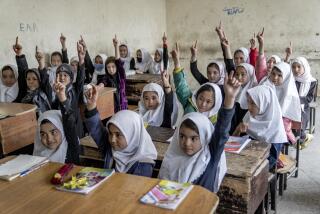In Afghan Town, Residents Find a New Harmony
- Share via
TALOQAN, Afghanistan — Since early last year, the wedding singer had been afraid to even hum a tune to himself, let alone sing out loud. In a country where songs were banned, the music in his soul was quiet.
But when the Taliban abandoned this northern Afghan town a little more than a week ago, Mohammadvali invited two other music lovers to his home for what may have been regarded as an illegal activity under the Taliban’s strict Islamic rule.
He filled his lungs with air, and for the first time in 18 months, burst forth with his favorite song. He sang about beauty, a lyrical piece about a woman taking off her burka, the full-length shroud most Afghan women wear.
Mohammadvali’s fingers, however, have yet to return to the strings of a ghichak, a traditional Afghan instrument he used to play. When the Taliban came to power, he burned his musical instruments. Now, his musician’s hands are blackened with oil from the job he was forced to take up under Taliban rule: metal repairman.
About 30 miles from where Mohammadvali rents a shop in the bazaar, thousands of desperate Taliban fighters are trapped in and around the city of Kunduz, encircled by Northern Alliance troops. No one here thinks the regime has any chance of making a comeback.
Taloqan is a bustling town with wide, tree-lined avenues teeming with horse-drawn taxicabs, donkeys laden with firewood, bicycles and trucks with crowds of Northern Alliance fighters on board. There is an air of celebration.
The town’s heart and soul is the sprawling bazaar, where the several shops now selling musical recordings were crammed with buyers Monday. In the Ali A Pharmacy, one of the owners played with an imitation Game Boy, another post-Taliban novelty.
At last, life is returning to normal here. So normal, in fact, that an instant audience of several dozen crowded around as Mohammadvali, 47, gave an impromptu performance of “Nozik Andom,” the song he sang the night the Taliban left. Under the regime, any gathering of more than a few people faced dispersal or even arrest.
“It’s a song about the beauty of women. It’s my favorite song of all, because it is wonderful when you are singing about something beautiful,” he said.
In Taliban days, there was no singing at weddings. But two days ago, the wedding singer had his first professional commission in 18 months.
“I felt marvelous. I felt as if I’d been let out of prison,” he said.
He learned to repair metal at 13 and trained as a professional singer at 22. To him, there is no comparison between the two occupations.
“Of course I love to sing, but I never once sang under the Taliban. I always thought about it. I missed my songs.
“But I was afraid to even hum. There were people who could punish me for that.”
He plans to return to his beloved singing after Ramadan, the Muslim month of fasting, is over. But he will retain his metal repair business too.
The clearest sign that life is returning to normal is that people are losing their fear. Mohammadvali spat out his contempt for the previous rulers in front of the bazaar crowd.
“In the Taliban time, all you could do was pray,” he said, kicking at the low wooden stool where he sits all day, hammering and tinkering.
In another shop in the bazaar, Asadulah Dorufugh, who sells veterinary medicine, said he spent three months in jail after Taliban police arrested a man for keeping a satellite dish and found Dorufugh’s shop address in his pocket.
For Shermohammad, 40, a taxi driver who once spent a night in jail for listening to his car radio, freedom meant taking a shovel, going into his dirt yard and digging up all the prohibited items the family had buried 18 months ago: 10 pairs of high-heeled shoes from distant places like Taiwan; a bright red, Russian-made Yunost brand television; a tape player and some cassettes.
His daughter, Zahro, 9, said she liked TV. But she no longer remembers which knob turns the set on.
On Monday, Kabul television began broadcasting for the first time since the Taliban took power, but Shermohammad does not have his television set up and doubts it would receive a signal from the capital. Without electricity, he will run it from a car battery.
“I used to like news programs and musical shows,” he said.
Music and televisions aren’t the only things coming out into the open again in Taloqan. Behind one of the town’s anonymous gates lies what was until a week ago an illegal, clandestine girls school. But Zokira, a 12-year-old student, knows it is now safe to tell the truth, and she pointed out the place where she is learning to read and write. In the past, she would hurry to school with her books hidden.
“We learned how to hide from the Taliban,” she said. “My parents said, ‘Daughter, go and study. But don’t tell anyone.’ I was afraid.”
Shermohammad sent his four daughters to a similar secret school.
“I want them to be able to work, to be doctors, teachers or responsible bureaucrats,” he said. The fee was less than $1 per child per month.
Neelufar, 24, Zokira’s teacher, said her main aim was to get girls to read, write and express their thoughts, “so that they can stand on their own two feet and choose where their future lies.”
Taloqan’s official girls school was taken over by the Taliban for a military base. Now it’s occupied by Northern Alliance soldiers. It’s not clear if it will be reopened.
“It’s one of the country’s biggest woes that few people are educated,” Neelufar said.
Ask people which changes are most noticeable since the Taliban left and they list simple things that people in many countries take for granted. Women walking alone (though nearly all still shrouded). High heels. Clutches of people gathered in the streets. A small girl prancing along and tapping a drum lightly with her fingers, followed by a band of small children.
All things that would have been illegal just over a week ago.
More to Read
Sign up for Essential California
The most important California stories and recommendations in your inbox every morning.
You may occasionally receive promotional content from the Los Angeles Times.













